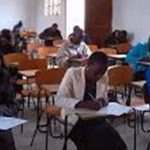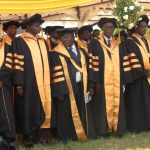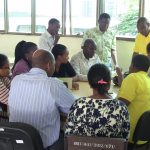Bachelor of Arts in English Language & Linguistics (BA ELL)
This programme aims to introduce students to the nature, structure, and uses of language and develop an understanding of descriptive and applied linguistic knowledge.The Course duration has maximum of eight years. Completion of the study depends on individual study efforts but the minimum period a candidate allowed is three years. All candidates are required to take at least 36 OUT credits which is equivalent to 360 TCU credits, each unit covering content materials equivalent to thirty-five one-hour lecture materials. Candidate registered for a Bachelor of English Language and Linguistics (BA EL) are carrying out studies by distance mode through coursework and examinations; online (through Moodle platform) and face-to-face twice a year.
Programme Summary
Course Name: BA English and Linguistics
Course Initials: BA ELL
Duration:
Total Units: Minimum 36, Maximum 42
Mode of Deliverence: Blended
Programme Informations
The entry qualifications to this programme of the Open University of Tanzania [OUT] are:
- Two principal passes with a total of 4 points in arts subjects, one of which must be English language subject.
- Recognition of Prior Learning Qualification which is B+ grade (where A =75-100, B+ = 65-74, B=50-64, C =40-49, D = 35-39, F = 0-38).
- C) Foundation Certificate with a minimum GPA of 3.0 calculated from the six subjects taught in the programme.
- d) At least four O’-Level passes (Ds and above) or NVA Level III with less than four O’Level passes or equivalent foreign qualifications as established by either NECTA or VETA.
AND
Ordinary Diploma (NTA Level 6) in education, languages, journalism, mass communication, public relations, communication skills, law and tourism with a GPA of 3.
- e) At least four O’-Level passes (Ds and above) or NVA Level III with less than four O’ Level passes or equivalent foreign qualifications as established by either NECTA or VETA.
AND
Ordinary Diploma in education, languages, tourism, journalism, mass communication, public relations, law and communication skills, with average of B.
Level One – Level Three
Level I: The candidate shall take all core courses and one elective, making a total of 12 units
Course Code | Course name | TCU Credits | OUT Units | Status |
OLL 131 | Introduction to Language and Linguistics | 20 | 2 | Core |
OLL 132 | English Structure | 20 | 2 | Core |
OLL 133* | Introduction to Functional Grammar | 20 | 2 | Elective |
OLL 134 | Language in Contact | 20 | 2 | Elective |
OLL 135 | Language Acquisition Theories | 20 | 2 | Core |
OLL 136 | History and Development of English Language | 20 | 2 | Core |
OFC 017 | Communication Skills | 10 | 1 | Core |
OCP 100 | Introduction to Computer | 10 | 1 | Core |
+One elective course 2 Units = 20 TCU credits
- Level II The candidate shall take all core courses and one elective, making a total of 12 units
Course code | Course name | TCU Credits | OUT Units | Status |
OLL 231 | Discourse Analysis | 20 | 2 | Elective |
OLL 232 | Morphology | 20 | 2 | Core |
OLL 233 | Introduction to Syntax | 20 | 2 | Core |
OLL 234 | Historical and Comparative Linguistics | 20 | 2 | Elective |
OLL 235 | Phonetics and Phonology | 20 | 2 | Core |
OLL 236 | Applied Linguistics | 20 | 2 | Core |
OLL 237 | Translation Theory and Practice | 20 | 2 | Core |
OLL 238 | Lexicography | 20 | 2 | Elective |
|
|
|
|
|
- Level III
- The candidate shall take all core courses and one elective, making a total of 12 units.
Course code | Course name | TCU Credits | OUT Units | Status |
OLL 331 | Contemporary Linguistic Theories |
|
| Core |
OLL 332N | Language and Gender |
|
| Elective |
OLL 333N | Sociolinguistics |
|
| Elective |
OLL 334 | Research Methodology |
|
| Core |
OLL 335N | Semantics and Pragmatics |
|
| Core |
OLL 336N | Advanced English Syntax |
|
| Core |
Payments are done per unit where as one unit costs 60,000. In addition to tuition fee, students will be required to pay other charges like examination fees, essential reference books, stationeries and other related costs for research projects.
| NAME | CONTACTS |
| Mr Masatu Mosi | Email:mosi.mlibwa@out.ac.tz Phone number: +255 757 254 312 |
A student who will graduate in Bachelor of Art in English Language and Linguistics will have the academic ability and the competence to apply the acquired theories, approaches and knowledge of English language to critically evaluate and determine the quality and the validity of any English materials especially in linguistics disciplines. The student will precisely be able: to describe the nature, structure, and use of language and develop an understanding of the basic components of linguistic knowledge, understand the meaning of linguistics science, with special attention on descriptive and applied linguistics and to show the relationship between linguistic data and language learning and teaching theories and models. Furthermore, the student will understand the effects of social factors on language, explain ways in which languages change, describe sound system of languages and underlying representation of the sound structure and lexicon and analyzing the nature, structure, and use of English language.
The assessment process of the programme will comprise two parts, namely, Coursework in which a student will sit for examinations and assessed at 30% continuous assessment (timed test) and 70% final Examination. A candidate shall be regarded to have passed a course if he/she attains a minimum of 40% (C) in each course.



